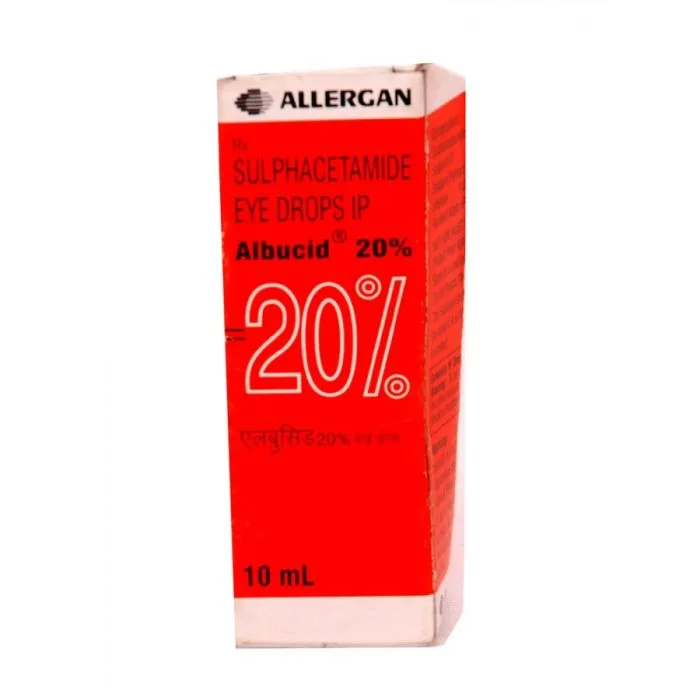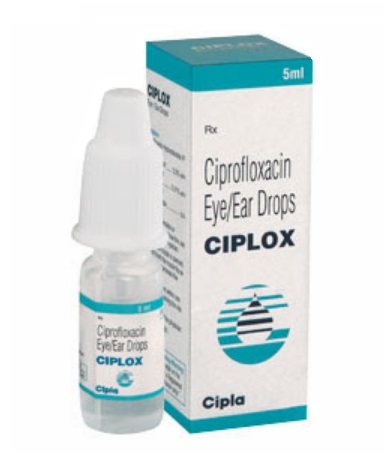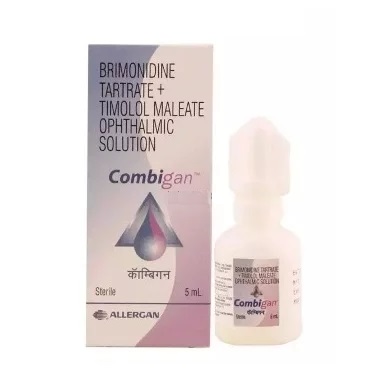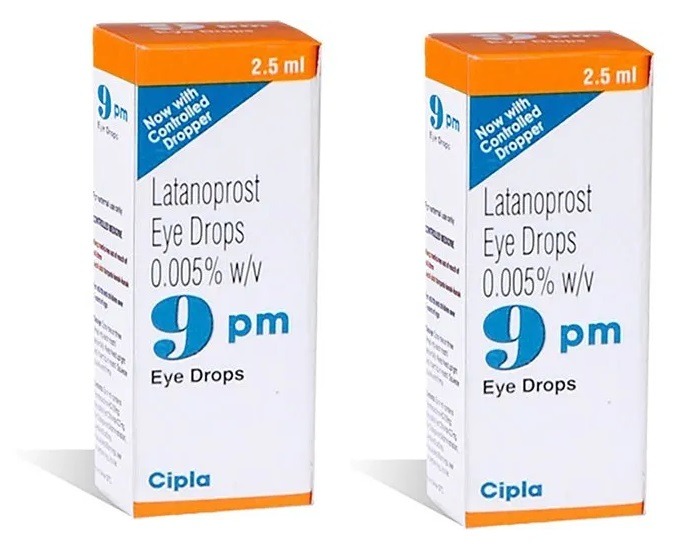Albucid Eye Drops
Finding a reliable method to treat bacterial eye infections is essential in a world where our eyes are continuously exposed to a variety of irritants and infections. Sulfacetamide Sodium Eye Drops, often known as Albucid Eye Drops, has become a well-respected treatment for such infections. This article explores the world of albucid eye drops, examining their efficacy, applications, and potential to treat bacterial eye infections.
The pharmaceutical medicine Albucid Eye Drops, which come in a 10 ml bottle, is intended for use in the eyes. These eye drops have a special medicinal function associated with maintaining eye health. The Eye drops are a sterile solution containing sulfacetamide sodium as the active ingredient. They belong to a class of medications known as sulfonamides, which are antibiotics used to treat bacterial infections. These eye drops are primarily used to treat eye infections caused by susceptible bacteria.
Uses
Albucid eye drops are utilized to treat bacterial eye infections. By inhibiting bacterial growth, these drops effectively alleviate symptoms such as redness, irritation, and discharge, promoting quick recovery and restoring ocular health
How Albucid Eye Drop Works?
Albucid Eye Drops contain Sulfacetamide Sodium, a powerful antibiotic that specifically targets bacteria responsible for eye infections. When applied, these drops inhibit the growth and reproduction of bacteria, effectively curbing the infection's progression.
Advantages of Using Albucid Eye Drops
- Rapid Symptom Relief
- Minimal Side Effects
How to Use Albucid Eye Drops ?
Using Albucid Eye Drops is straightforward. Here's a step-by-step guide:
- Wash Your Hands: Always begin by thoroughly washing your hands to prevent any additional contamination.
- Tilt Your Head Back: Gently tilt your head back and look up.
- Pull Down the Lower Eyelid: Use your index finger to pull down the lower eyelid, creating a small pocket.
- Apply the Drops: Hold the dropper close to your eye but avoid touching it. Squeeze the prescribed number of drops into the pocket you created.
- Close Your Eye: Close your eye gently to allow the drop to spread evenly across the surface.
- Avoid Blinking: Try not to blink immediately after applying the drops to ensure they are absorbed effectively.
- Repeat if Necessary: If your prescription calls for multiple drops, repeat the process for the other eye if needed.
When not to use Albucid Eye Drops
A number of eye infections and disorders are treated using albucid eye drops, sometimes referred to as sulfacetamide sodium eye drops. Albucid eye drops should not be used or should be used with caution in the following circumstances:
- Allergic Reaction: Sulfacetamide sodium and other ingredients in Albucid eye drops should not be used if you have ever experienced an adverse response to any of them. Itching, swelling, rash, and breathing problems are all possible signs of an allergic reaction. If you encounter any of these symptoms, get help right away.
- Use with Contact Lenses: Eye drops containing albucid may contain preservatives that may interfere with wearing contacts. Typically, it is advised to take out your contact lenses before using the drops and to wait at least 15 minutes before putting them back in. To get more detailed instructions on how to use eye drops with contact lenses, it is recommended to speak with an eye care specialist.
- Eye disorders: Without the advice and supervision of an eye professional, do not use Albucid eye drops if you have certain eye disorders, such as a serious corneal abrasion or ulcer. Without medical advice, using the drops in these situations has the potential to make the disease worse.
- Breastfeeding and pregnancy: Before using Albucid eye drops, talk to your doctor if you're expecting or nursing a baby. Although there is little proof that sulfacetamide sodium is safe to use during pregnancy and nursing, it is crucial to go over the advantages and dangers with your doctor.
- Children: The use of albucid eye drops in kids is generally regarded as safe. To prevent any negative effects, it is essential to adhere to the dose guidelines given by a healthcare provider and ensure adequate application.
- Other Drugs: Tell your doctor if you are presently taking any other drugs for your eyes. These drugs may interact with albucid eye drops or be contraindicated by them.
Side Effects
Sulfacetamide sodium eye drops, sometimes referred to as Albucid eye drops, are a drug used to treat certain eye diseases including eye infections. Although they are typically regarded as safe and effective, they can have negative effects, but not everyone will. It is crucial to see a doctor if you or someone you know is using Albucid eye drops and develops any of the following negative effects:
- Eye Irritation: After using Albucid eye drops, some persons may feel brief discomfort, stinging, or burning sensations in the eyes. This is a typical side effect, and it typically goes away soon.
- Redness: The use of eye drops or the treatment of the underlying ailment may cause redness of the eye.
- Itching: As a slight adverse reaction to the drug, itching in and around the eyes is possible. Temporary blurriness or alterations in vision may be noticed in several circumstances. Typically, this is momentary and will get better.
- Allergic Reactions: Sulfacetamide sodium, which is the active component, occasionally causes allergic reactions in some people. Swelling, redness, itching, extreme dizziness, or trouble breathing are all indications of an allergic reaction. Seek emergency medical assistance if any of these symptoms appear.
- Eye Pain: People with sensitive eyes may feel like something is in their eyes, or they may produce more tears than usual.
- Eye Dryness: Dry eyes might occasionally result from using albucid eye drops. If this starts to trouble you, speak with your doctor.
- Eye Sensitivity to Light: Some people may experience temporary photophobia (sensitivity to light).In some rare instances, albucid eye drops may result in ocular irritation. Call your healthcare practitioner if you have more swelling, discomfort, or redness.
- Secondary Infections: Using Albucid eye drops improperly or for an extended period of time can result in secondary bacterial or fungal infections. Be sure to adhere to your doctor's directions.
Precautions
While Albucid Eye Drops are generally safe, there are a few precautions and considerations to keep in mind:
- Allergies: Inform your healthcare provider if you have allergies to any medications, including sulfa drugs, before using Albucid Eye Drops.
- Contact Lenses: Remove contact lenses before applying the drops and wait at least 15 minutes before reinserting them.
- Pregnancy and Breastfeeding: Consult your healthcare provider if you are pregnant or breastfeeding before using Albucid Eye Drops.
Frequently Asked Questions
Are Albucid Eye Drops available over the counter?
Albucid Eye Drops are typically available only with a prescription from a healthcare provider. It's essential to consult a professional before use.
How long does it take for Albucid Eye Drops to work?
Many users experience relief within a few days of using Albucid Eye Drops. However, it's essential to complete the full course of treatment as prescribed.
Can Albucid Eye Drops be used for children?
Yes, Albucid Eye Drops are safe for children, but it's crucial to follow the dosage instructions provided by a healthcare provider.
Are there any side effects of Albucid Eye Drops?
While side effects are minimal, some users may experience mild burning or stinging upon application. If you experience severe discomfort, consult your healthcare provider.
Can I use Albucid Eye Drops while wearing contact lenses?
It's recommended to remove contact lenses before applying Albucid Eye Drops and wait at least 15 minutes before reinserting them to avoid potential irritation.
Conclusion
Albucid eye drops offer a valuable solution for treating bacterial eye infections and protecting newborns from potential eye issues. When used correctly and under the guidance of a healthcare professional, these eye drops can provide quick relief and help maintain your eye health. Remember to follow the recommended dosage instructions and consult your doctor if you experience any unusual side effects.
Your review is submitted successfully. It will be live after approval, and it takes up to 24 hrs.







